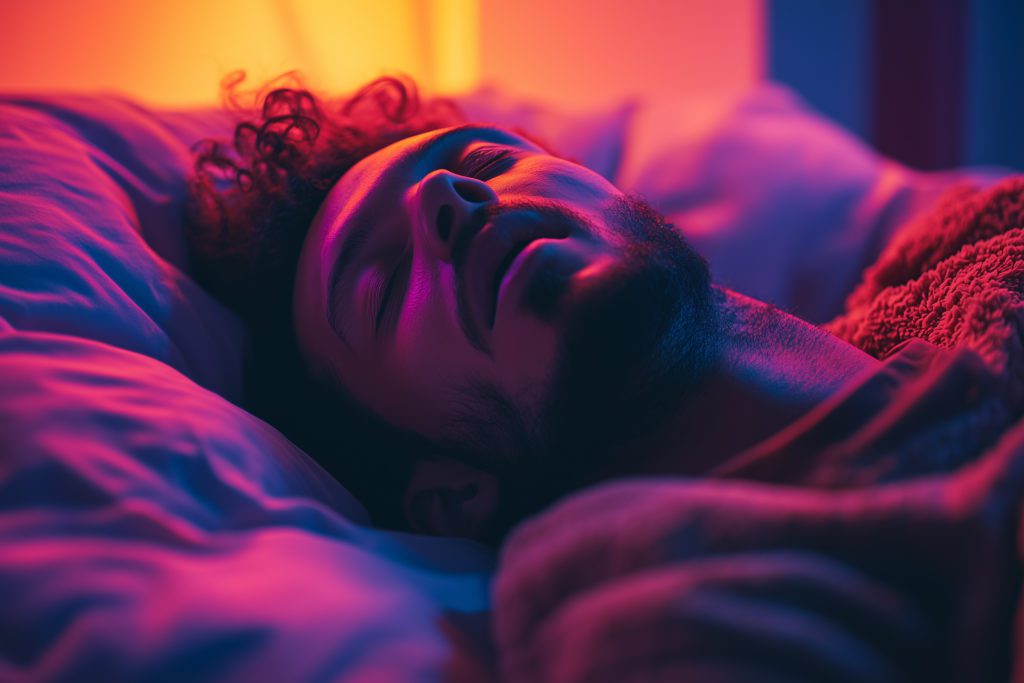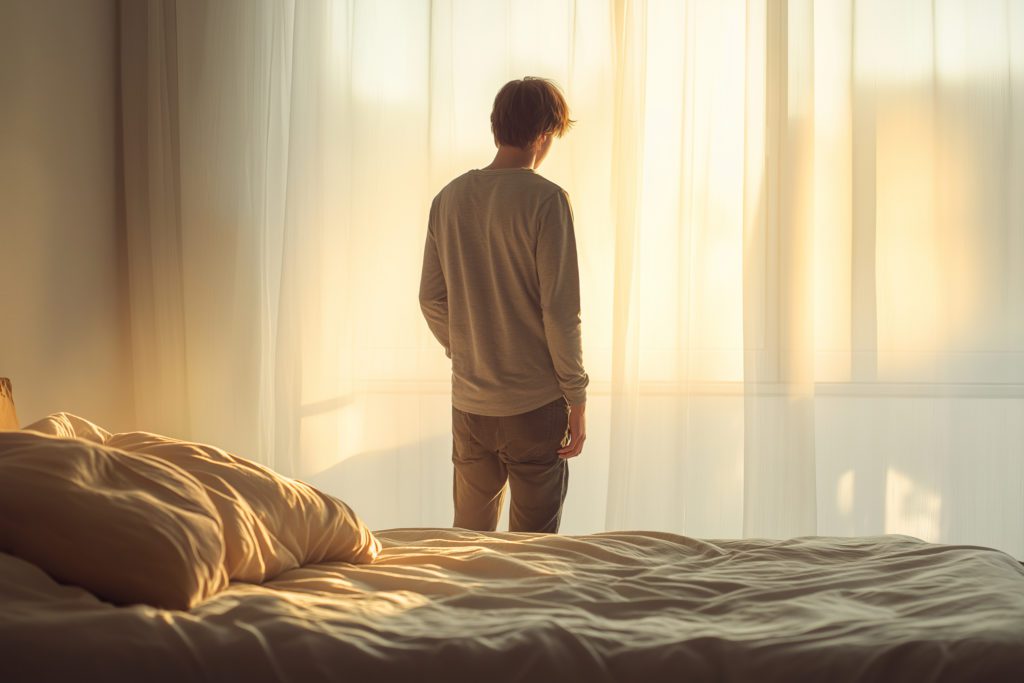
Is There Such a Thing as Too Much Sleep?
Sleeping more than nine hours in a 24-hour period is linked to many health problems, including diabetes and heart disease. Here’s how to stop oversleeping.

Recently actress Dakota Johnson revealed to the Wall Street Journal that she easily sleeps for 14 hours a night if she’s not working. In fact, she says that she sleeps as long as possible. This news has gone viral with many people wondering if they should do the same. Is it healthy to sleep that much? According to sleep experts, the answer is a resounding “no.” There is such a thing as too much sleep.
While many people are aware of the consequences of not getting enough sleep — from an increased risk of accidents to more colds, the effects of too much sleep are not as highly publicized. However, there is lots of evidence that oversleeping can pose many problems.
How Much Sleep Do You Need?
Wondering how much sleep you should be getting a night? Adults between the ages of 18 and 64 need between seven and nine hours of sleep a night. Teenagers should get a solid eight to ten hours a night. Older adults over the age of 65 can get by with seven to eight hours a night. Women need slightly more sleep than men. Generally, if you are an adult and are sleeping more than nine hours a night, then you’re sleeping too much.
Why Oversleeping is Problematic
You might have overslept before when recovering from a stressful work week, while sick, or after a busy weekend. Occasionally sleeping more than nine hours a night is not usually a serious cause for concern. We all need some time to recuperate after an illness or tough day. However, consistently oversleeping can lead to:
- Low energy and fatigue: Sleeping too much can cause you to feel lethargic the next day.
Diabetes and obesity: Those who sleep more than nine hours a night are more likely to experience obesity, diabetes, and weight gain. Research has found that those who slept more than ten hours a night were at the highest risk for type 2 diabetes. - Cardiovascular and heart disease: Men and women who oversleep have an increased risk of cardiovascular disease and a higher mortality rate from cardiovascular disease. In one study, those who slept more than 10 hours a night were twice as likely to have a heart attack.
- Lowered immune functioning: Longer sleep durations have been associated with poor immune system function. That is likely because it interferes with cytokine production, which are proteins that aid immune function.
- Increased risk of death: People who sleep significantly more than nine hours a night have been shown to have an increased risk of mortality. They are more likely to die earlier compared to those who sleep between seven and nine hours a night.
Reasons Why You Are Oversleeping
There are a number of reasons why a person might oversleep. You might be oversleeping because of a mental health issue or sleep disorder. Here are some of the most common reasons.
Untreated Obstructive Sleep Apnea
Obstructive sleep apnea (OSA) is a common sleep disorder that causes a person to stop breathing repeatedly during sleep. As a result, people with sleep apnea don’t get good quality sleep. Therefore, they may feel as though they need to sleep more than nine hours a night.
Depression
Depression is a common mood disorder characterized by sad mood, fatigue, and little interest in normal activities. Oversleeping is a common symptom of depression. In one study, people with depression were 3 to 12 times more likely to oversleep compared to those without the disorder. Besides oversleeping, a person may not even realize they are depressed.
Hypothyroidism
If you have hypothyroidism, you are more likely to feel extremely fatigued during the day. This fatigue can be extreme and can cause you to oversleep. You may sleep nine or ten hours a night but still feel completely exhausted.
Lifestyle Factors
Numerous lifestyle factors can play a role in oversleeping. People tend to sleep for longer periods of time in the winter. Additionally, menstruation can impact sleep levels. Women may feel the need to sleep more during their menstrual period.
How to Avoid Oversleeping
Sleeping too much can be a tough habit to break. However, changing your daily routines can help.
- Get the same amount of sleep each night: Don’t try to make up for missed sleep by sleeping in on the weekends. It’s better to get the recommended amount of sleep every night.
- Don’t hit the snooze button: Repeatedly hitting the snooze button can lead to oversleeping. If you have a hard time keeping your hands away from the snooze button, put your alarm on the other side of the bedroom.
- Get natural light when you wake up: Light exposure in the morning can be helpful for increasing alertness.
Take a morning walk: It’s a good idea to get exercise early in the morning to boost alertness. Morning exercise wakes the body up. - Avoid long naps: If you are taking two hour naps in the afternoon, your total sleep time could easily add up to more than ten hours in a 24-hour period. This will cause you to wake up from your nap with sleep inertia (grogginess). If you nap, take short power naps.
- Have a nighttime wind-down routine in place: Your routine might include listening to a sleep story on Pillow, doing a bedtime meditation practice, or taking a relaxing bath.
- Start your day with a cup of coffee: Caffeine early in the morning can be helpful for boosting alertness. Just make sure you limit your caffeine intake and drink it no later than six to eight hours before bed.
When To Talk to Your Doctor About Oversleeping
If you continue to oversleep after changing your bedtime routine, make an appointment with your physician. They will likely want to know the details of your sleep habits. Use Pillow to track your sleep so you can share this data with your physician. After reviewing your sleep history, your doctor may run various tests, or refer you to a sleep clinic to rule out sleep disorders.
FAQ
Can sleeping too much make you tired?
Yes, oversleeping can actually leave you feeling drained. Sleeping too long can mess with your internal clock, lowering sleep quality and causing grogginess, also known as sleep inertia, which can make you feel sluggish all day.
Is it okay to sleep more than usual sometimes?
Occasionally sleeping more than nine hours isn’t usually a concern. It’s normal to sleep longer after a period of illness, stress, or physical exertion as your body recovers. However, if oversleeping happens frequently and is paired with fatigue, mood changes, or other symptoms, it could signal an underlying health issue that needs attention.
Does oversleeping mess with your immune system?
Yes, too much sleep can disrupt the production of cytokines, which are important for your immune defense. This could weaken your immune system, making it harder for your body to fight off illnesses or recover quickly when you’re sick.
Can sleeping too much be a sign of depression?
Yes, sleeping too much can be a symptom of depression. Many people with depression experience hypersomnia, where they sleep excessively but still feel unrefreshed. This excessive sleep often coexists with other symptoms like low energy, sadness, and difficulty concentrating.
Can sleeping too much affect my physical health
Sleeping too much can negatively affect your physical health in several ways. It is linked to a higher risk of developing chronic conditions such as diabetes, heart disease, and obesity. Oversleeping can disrupt your body's natural rhythms, leading to hormonal imbalances and reduced physical activity, which may worsen these risks. Additionally, excessive sleep can strain the cardiovascular system, and some studies suggest it may be associated with increased inflammation in the body, potentially impacting overall well-being.
How much sleep is too much
Regularly sleeping over 9 hours is considered excessive. While individual needs vary, consistently exceeding this range could hint at health concerns or lifestyle imbalances that may need attention.
Why do some people sleep so much
Sleeping too much can be caused by medical issues like sleep apnea, depression, or hypothyroidism. It can also happen due to lifestyle factors like irregular routines, seasonal changes, or poor sleep habits that throw off your natural cycle.

Written by
Emily Mendez
Emily Mendez is a former therapist and mental health author. She is one of the leading voices in mental health. Emily's writing has appeared in eCounseling, SonderMind, and more. Emily is frequently interviewed by Healthline, Fatherly, INSIDER, Family Circle, and other national media for her advice and expert opinion on the latest mental health topics.
Download Pillow
Get help
Press & News
Legal
Connect
X (Twitter)
Company
Copyright © Neybox Digital Ltd.



